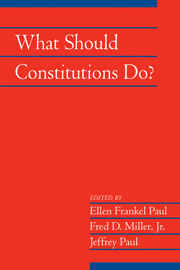Book contents
- Frontmatter
- Contents
- Introduction
- Acknowledgments
- Contributors
- What Are Constitutions, and What Should (and Can) They Do?
- Constitution and Fundamental Law: The Lesson of Classical Athens
- Contract, Covenant, Constitution
- Constitutionalism in the Age of Terror
- The Liberal Constitution and Foreign Affairs
- Do Constitutions Have a Point? Reflections on “Parchment Barriers” and Preambles
- The Origins of an Independent Judiciary in New York, 1621-1777
- Foot Voting, Political Ignorance, and Constitutional Design
- Pluralist Constitutionalism
- Deliberative Democracy and Constitutions
- The Constitution of Nondomination
- Can We Design an Optimal Constitution? Of Structural Ambiguity and Rights Clarity
- Index
Pluralist Constitutionalism
Published online by Cambridge University Press: 05 June 2012
- Frontmatter
- Contents
- Introduction
- Acknowledgments
- Contributors
- What Are Constitutions, and What Should (and Can) They Do?
- Constitution and Fundamental Law: The Lesson of Classical Athens
- Contract, Covenant, Constitution
- Constitutionalism in the Age of Terror
- The Liberal Constitution and Foreign Affairs
- Do Constitutions Have a Point? Reflections on “Parchment Barriers” and Preambles
- The Origins of an Independent Judiciary in New York, 1621-1777
- Foot Voting, Political Ignorance, and Constitutional Design
- Pluralist Constitutionalism
- Deliberative Democracy and Constitutions
- The Constitution of Nondomination
- Can We Design an Optimal Constitution? Of Structural Ambiguity and Rights Clarity
- Index
Summary
INTRODUCTION
The purpose of this essay is to explore the ways in which a broadly pluralist outlook can help illuminate long-standing issues of constitutional theory and practice. I begin by adopting a common-sense understanding of pluralism as the diversity of observed practices within a general category–in this case, constitutions (Section II). In the light of this understanding, many assumptions that Americans and others often make about constitutional essentials turn out to be valid locally rather than generically. I turn then to pluralism in a more technical and philosophical sense – specifically, the account of value pluralism adumbrated by Isaiah Berlin and developed by his followers. After offering a rough and ready account of this version of pluralism (Section III), I bring it to bear on a range of constitutional issues (Section IV). In doing so, I distinguish between, on the one hand, areas of variation among constitutions and, on the other, some basic truths about political life that define core constitutional functions. I conclude (Section V) with some brief reflections on the normative thrust of pluralist constitutionalism–in particular, its presumption in favor of the maximum accommodation of individual and group differences consistent with the maintenance of constitutional unity and civic order.
CONSTITUTIONAL DIVERSITY
It is easy for scholars working within particular national traditions to assume that the features of their own constitutions are definitive of constitutionalism as such. A brief glance across time and space suffices to dispel such parochial illusions.
- Type
- Chapter
- Information
- What Should Constitutions Do? , pp. 228 - 241Publisher: Cambridge University PressPrint publication year: 2011



